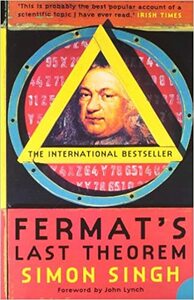You need to sign in or sign up before continuing.
Take a photo of a barcode or cover
informative
medium-paced
informative
medium-paced
Another brilliantly written book by Simon Singh! I don't always put the words "math" and "page-turner" together -- but in this case, I'll have to make an exception.Honestly, I didn't understand any of the math, but my hat's off to Singh for creating a compelling narrative for the quest to prove Fermat's Last Theorem!
informative
inspiring
medium-paced
informative
inspiring
medium-paced
me after the first few chapters: i dunno, this book alright i guess
me at the end of the book: oh my god i love mathematics. it is a beautiful vocation. andrew wiles deserves all the flowers.
tbh the book isn't just about fermat's last theorem per se, it's also about the history of mathematics and the community of people who have built it and the generations who have passed on their knowledge to the next. there are also bits and pieces about fermat's life as well as the lives of pythagoras, sophie germain, leonhard euler, evariste galois, yutaka taniyama, etc. all the way down to wiles himself. it meanders a bit, but i feel like the meandering is intentional. some of the meandering reflects the dead ends that mathematicians often face when trying to solve a problem (especially one as hard as fermat's last theorem), and some of the meandering is about some Cool Mathematical Fact only tangentially related to fermat. the latter usually gives the reader a sense of what kind of problems mathematicians work on in general, or what the zeitgeist was for a particular time in the math community.
singh writes for the broadest of audiences so even a person who was "bad at math" in school could reasonably understand it. in the earlier chapters there are explanations for some really simple proofs and why they are important historically. (DO NOT skip the appendices. imo the appendices really make the experience of reading this book and understanding the kind of logic that these mathematicians deal with.) in the later chapters the math isn't explained in detail anymore, which is understandable because even professional mathematicians struggle with what the fuck elliptic curves are. but there are still enough explanations of the general logic left in so that the reader can understand what the people involved are trying to do.
the reason that this is four stars rather than five is because of two flaws that kinda detracted from my reading experience: first, there are a bunch of anecdotes that aren't appropriately marked as disputed or apocryphal, which i felt was misleading (i spotted one about euler and another about karl wolfskehl, maybe there are others that i don't remember or missed entirely). which is weird because when it comes to galois, singh is pretty appropriately cautious about what may or may not be true about the circumstances of his death. the second was that i felt like singh at times treated the social and historical forces surrounding each mathematician as... an inconvenience? like "oh if it weren't for these political things, then these guys could have done more Cool Math." which could've been a choice to simplify the story and not bog it down with too much context, but idk as a social science girl i wasn't really feeling it.
but i tell you, i was GRIPPED by this book towards the end. was speed reading the last two chapters at a fuckin mcdonalds bc i needed to see how wiles fixed his proof. first thing i did after finishing the book was watch this video of wiles himself and i was absolutely enthralled
me at the end of the book: oh my god i love mathematics. it is a beautiful vocation. andrew wiles deserves all the flowers.
tbh the book isn't just about fermat's last theorem per se, it's also about the history of mathematics and the community of people who have built it and the generations who have passed on their knowledge to the next. there are also bits and pieces about fermat's life as well as the lives of pythagoras, sophie germain, leonhard euler, evariste galois, yutaka taniyama, etc. all the way down to wiles himself. it meanders a bit, but i feel like the meandering is intentional. some of the meandering reflects the dead ends that mathematicians often face when trying to solve a problem (especially one as hard as fermat's last theorem), and some of the meandering is about some Cool Mathematical Fact only tangentially related to fermat. the latter usually gives the reader a sense of what kind of problems mathematicians work on in general, or what the zeitgeist was for a particular time in the math community.
singh writes for the broadest of audiences so even a person who was "bad at math" in school could reasonably understand it. in the earlier chapters there are explanations for some really simple proofs and why they are important historically. (DO NOT skip the appendices. imo the appendices really make the experience of reading this book and understanding the kind of logic that these mathematicians deal with.) in the later chapters the math isn't explained in detail anymore, which is understandable because even professional mathematicians struggle with what the fuck elliptic curves are. but there are still enough explanations of the general logic left in so that the reader can understand what the people involved are trying to do.
the reason that this is four stars rather than five is because of two flaws that kinda detracted from my reading experience: first, there are a bunch of anecdotes that aren't appropriately marked as disputed or apocryphal, which i felt was misleading (i spotted one about euler and another about karl wolfskehl, maybe there are others that i don't remember or missed entirely). which is weird because when it comes to galois, singh is pretty appropriately cautious about what may or may not be true about the circumstances of his death. the second was that i felt like singh at times treated the social and historical forces surrounding each mathematician as... an inconvenience? like "oh if it weren't for these political things, then these guys could have done more Cool Math." which could've been a choice to simplify the story and not bog it down with too much context, but idk as a social science girl i wasn't really feeling it.
but i tell you, i was GRIPPED by this book towards the end. was speed reading the last two chapters at a fuckin mcdonalds bc i needed to see how wiles fixed his proof. first thing i did after finishing the book was watch this video of wiles himself and i was absolutely enthralled
challenging
informative
inspiring
tense
medium-paced
Rarely do you find such a brief account of scientific discovery so well-written and turn-the-page interesting. An excellent distillation of intricate mathematics to provide an understanding of the complexity of Fermat's legacy and the ensuing 300+ year-old chase for proof. Fun!
informative
inspiring
reflective
fast-paced
Amazing book! Very entertaining read.
Side note, Reading that Goro said "I told you so" in response to the Taniyama and Shimura conjecture being proven was amazing
Minor: Suicide
I read this just after the book about cryptography from the same author. In the beginning I felt that it was too soon. It felt a bit the same. Also it was about simple things that I knew, then it was about things that I didn't know but seemed just put there. Then in the final chapters everything starts to fit like in a good mystery book and I could not stop reading. I liked it. It made me feel a part of the joy that the mathematics community felt. Even though I will never be as smart as those guys, the book brought me closer to them.



